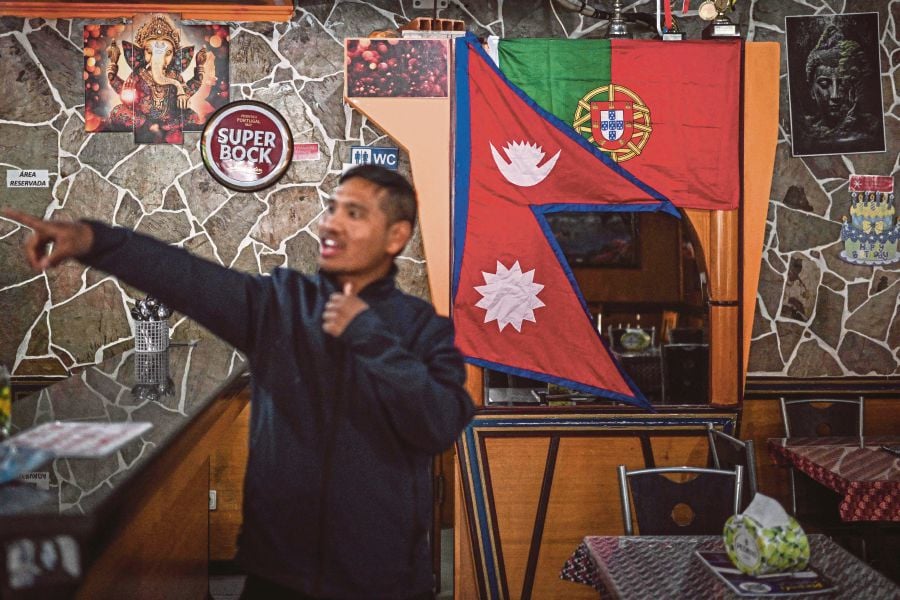IN Sao Teotonio, a small country town in southwest Portugal, there are more Indian and Nepalese restaurants than Portuguese ones.
Which makes sense when you discover South Asian workers keep the fruit farms that are the mainstay of the region going.
Nepalese immigrant Mesch Khatri, 36, picks raspberries and strawberries in the greenhouses around Sao Teotonio while his wife, Ritu, 28, runs their cafe, called the Nepali, in the town.
Their 7-year-old son speaks Portuguese, a little English, but no Nepali at all.
Khatri moved to Portugal in December 2012. Five years after arriving in Portugal, he had residency, and two years after that, a Portuguese passport.
While migrants in most other European countries face a deliberately dissuasive obstacle course to get papers, resulting in many working illegally, in Portugal, it is the other way around.
Immigrants are quickly absorbed into the legal economy, paying taxes and social charges straight away.
While the agricultural Alentejo region has been losing its people for decades, the population has gone up 13 per cent in the last decade.
Migrant farm workers have brought life back to an area badly hit by the flight from the land.
Portugal has seen its foreign-born population double in five years, partially due to South Asians who work in farming, fishing and restaurants.
The influx has been encouraged by the socialist government, in power since the end of 2015, but this could change if the country shifts to the right after yesterday's general election.
Fewer than half a million in 2018, last year, a million foreigners were living in Portugal, or one in 10 of the population, according to provisional figures by Aima, the state agency for integration, migration and asylum.
Brazilians remain the biggest contingent — around 400,000 — followed by the British and other Europeans.
But the 58,000 Indians and 40,000 Nepalis outnumber other people from Portugal's former African colonies like Angola and Cape Verde.
Bangladeshis and Pakistanis now also figure in the top 10 of new arrivals.
"The main reason Portugal has seen the number of immigrants rise is because it needs them," said Luis Goes Pinheiro, the head of Aima, saying the country has Europe's most ageing population after Italy.
Far from the "sea of plastic" of greenhouses around Sao Teotonio, Luis Carlos Vila also depends on foreign workers to pick his apples in an isolated corner of the northeast.
"I have no other choice. We have an elderly population and there are no more agricultural labourers."
Six Indians were hard at work in his orchards in Carrazeda de Ansiaes.
"I love Portugal," said Happy Singh, a Punjabi Sikh in halting English. "The money is good, the work is good and the future is good. In India, there is no future."
Vila sees in his foreign workers a little of his own family history. "My father also had to emigrate (to France) to earn a living."
Even among the most traditional of Portuguese fishing communities like Caxinas near Porto, half of the crews are made up of Indonesians.
At the helm of his 20m trawler the Fugitive, Jose Luis Gomes is resigned to the fact that his compatriots no longer want to do this tough job.
Javanese fisher Saeful Ardani, 28, was working his fourth 18-month contract for Gomes.
He told AFP that the "Indonesian fishermen who work here have no problems. And our families back home are reassured because we are not illegal".
A country of emigrants throughout the 20th century, Portugal has become a destination for immigrants since the turn of the 21st.
"Whatever indicator you take, it is one of the most generous" countries in Europe when it comes to immigration, said Jorge Malheiros, a migration specialist at Lisbon University.
In the capital Lisbon, there are noticeably more South Asian bicycle delivery riders than before.
During Friday prayers, hundreds of Muslims queue to get into one of the two mosques in the narrow streets of Mouraria, the medieval Moorish quarter.
Its central street, the Rua do Benformoso, now has so many Bengali shops and restaurants that it is nicknamed Bangladesh Street, said Yasir Anwar, a 43-year-old Pakistani.
Anwar got a job with a restaurateur who taught him the language and how to cook Portuguese food.
"Portugal has become a good country for immigrants and welcomes them with open arms."
The writer is from Agence France-Presse





